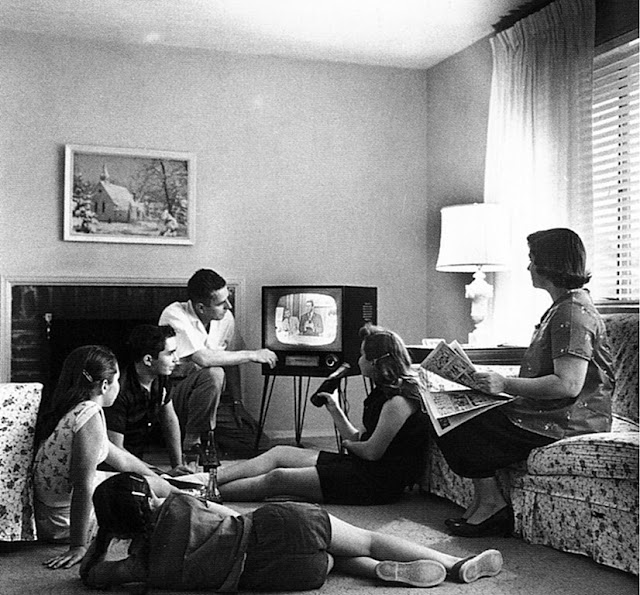There was a time when most households got 3 (or 4 depending on the specific time period) broadcast television stations and PBS. That is all you had to choose from for your viewing pleasure. Want to see a movie? Well you'd go the the theater, the only option for seeing movies. Want to listen to music? You'd listen to the radio, where there would be a handful of stations to choose from. The result is that everyone was watching the same t.v. shows, seeing the same movies, and hearing the same music. While that didn't allow for a lot of avenues for finding things outside of the mainstream, it did give everyone common points of interest. You might not agree on Kennedy or Nixon, but you could both agree that The Man From U.N.C.L.E. was great last night!
The internet didn't come along and single handedly blow this all up. First came cable television. At first cable t.v. (at least in my area) consisted of only a few channels. HBO was a big game changer, and other early channels that were exciting were Nickelodeon and MTV. The Disney Channel was also a big deal, but it was an extra subscription so most people we knew didn't have it. But suddenly there were these new channels available, and you would talk with kids in the schoolyard about what you watched and they were bringing up things you'd never heard of. Pop culture was becoming siloed off into groups who had access and those who did not. Even among the kids who had cable, some were watching MTV all day and talked about the new Twisted Sister video, while some were watching Nickelodeon and talking about You Can't Do That On Television.
Then came home video. Now suddenly you could see movies that none of your friends had ever heard of. If you found a really good video store, you could even see movies from other countries. People in even small towns that only had one movie screen could become specialists in 70's Italian horror movies. Now people were even more divided on the pop culture they consumed. Where once the entire school bus would be abuzz with chatter from everyone who watched V the night before, now no one was watching the same things at the same times, or at all.
The internet, far from beginning this process, actually delivered the final blow. First came Netflix, and it looked for a little bit like it might return a pop culture public square. Everyone was using this one service, and while they might not all be streaming the same things at the same time, they were pulling from the same pool of content. Then corporations saw how much money Netflix was making. Now every company has it's own streaming platform. Even music and video games are now streaming. (There is another conversation about how we never own our entertainment now but are constantly renting it, but that's a whole other post and outside the purview of this blog.) No one can afford to subscribe to every platform, so people don't have the same pop culture experiences. Gone are the days of people talking about what a dolt Archie Bunker was last night around the water cooler. Now someone brings up a show they are watching and the reply is "I don't have Hulu" and the conversation grinds to a painful halt.
I'm not saying that if we all just watch the same t.v. show together it would heal all the nation's wounds. But I am saying that if we had more in common in our pop culture it might give us a starting point for conversation. It might make people realize that someone who has different political views, or ethnic background, or whatever is still human, because they like the thing that you like. It might be completely coincidental that our pop culture environment fractured at the same time as our national discourse, but maybe it's not.

Comments
Post a Comment